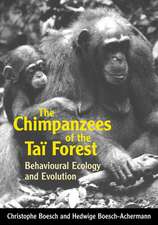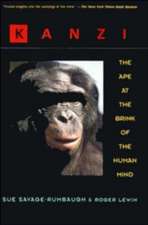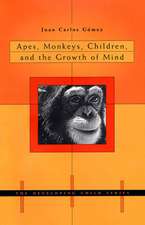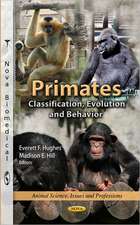Primate Behavior and Human Origins
Autor Glenn Kingen Limba Engleză Paperback – 9 noi 2015
| Toate formatele și edițiile | Preț | Express |
|---|---|---|
| Paperback (1) | 455.79 lei 6-8 săpt. | |
| Taylor & Francis – 9 noi 2015 | 455.79 lei 6-8 săpt. | |
| Hardback (1) | 750.25 lei 6-8 săpt. | |
| Taylor & Francis – 16 noi 2015 | 750.25 lei 6-8 săpt. |
Preț: 455.79 lei
Nou
Puncte Express: 684
Preț estimativ în valută:
87.24€ • 94.80$ • 73.33£
87.24€ • 94.80$ • 73.33£
Carte tipărită la comandă
Livrare economică 21 aprilie-05 mai
Preluare comenzi: 021 569.72.76
Specificații
ISBN-13: 9781138853171
ISBN-10: 1138853178
Pagini: 462
Ilustrații: 5 black & white tables, 60 black & white halftones
Dimensiuni: 174 x 246 x 28 mm
Greutate: 0.92 kg
Ediția:1
Editura: Taylor & Francis
Colecția Routledge
Locul publicării:Oxford, United Kingdom
ISBN-10: 1138853178
Pagini: 462
Ilustrații: 5 black & white tables, 60 black & white halftones
Dimensiuni: 174 x 246 x 28 mm
Greutate: 0.92 kg
Ediția:1
Editura: Taylor & Francis
Colecția Routledge
Locul publicării:Oxford, United Kingdom
Public țintă
UndergraduateCuprins
Introduction
1. The Primates: Meet Your Relatives
2. The Study of Primate Behavior
3. Primate Ecology and Behavior: Common Features
4. The Strepsirrhine Suborder
5. The Lorisiform Infraorder: Strepsirrhines in the Dark
6. Lorisiform Variation: Leapers and Creepers
7. The Lemuriform Infraorder: Island Refuge
8. Lemuriform Variation: The Night Life
9. Lemuriform Variation in the Light of Day
10. The Tarsioid Suborder: Common Features and Variation
11. The Anthropoid Suborder: Monkeys and Apes
12. The Platyrrhine Infraorder: New World Monkeys
13. Platyrrhine Variation: Atelids and Pitheciids
14. Platyrrhine Variation: Cebids
15. Cebines: Squirrel Monkeys and Capuchins
16. The Catarrhine Infraorder: Old World Monkeys and Apes
17. The Cercopithecoid Superfamily: Old World Monkeys
18. Cercopithecoid Variation: Leaf Eaters and Cheek Pouchers
19. A Cercopithecine Tribe: the Guenons
20. A Cercopithecine Tribe: the Papionins
21. Genus Papio: the Real Baboons
22. The Hominoid Superfamily: Apes Small and Large
23. Great Apes of Asia: Orangutans
24. Great Apes of Africa: Gorillas
25. Great Apes of Africa: Common Chimpanzees
26. Bonobos: Lightweight Chimpanzees
27. Human Origins: the Last Common Ancestor
28. Early Hominin Evolution: the Australopiths
29. Our Evolutionary Heritage: The Primate in Us
30. Primate Conservation: Will Any Be Left?
1. The Primates: Meet Your Relatives
2. The Study of Primate Behavior
3. Primate Ecology and Behavior: Common Features
4. The Strepsirrhine Suborder
5. The Lorisiform Infraorder: Strepsirrhines in the Dark
6. Lorisiform Variation: Leapers and Creepers
7. The Lemuriform Infraorder: Island Refuge
8. Lemuriform Variation: The Night Life
9. Lemuriform Variation in the Light of Day
10. The Tarsioid Suborder: Common Features and Variation
11. The Anthropoid Suborder: Monkeys and Apes
12. The Platyrrhine Infraorder: New World Monkeys
13. Platyrrhine Variation: Atelids and Pitheciids
14. Platyrrhine Variation: Cebids
15. Cebines: Squirrel Monkeys and Capuchins
16. The Catarrhine Infraorder: Old World Monkeys and Apes
17. The Cercopithecoid Superfamily: Old World Monkeys
18. Cercopithecoid Variation: Leaf Eaters and Cheek Pouchers
19. A Cercopithecine Tribe: the Guenons
20. A Cercopithecine Tribe: the Papionins
21. Genus Papio: the Real Baboons
22. The Hominoid Superfamily: Apes Small and Large
23. Great Apes of Asia: Orangutans
24. Great Apes of Africa: Gorillas
25. Great Apes of Africa: Common Chimpanzees
26. Bonobos: Lightweight Chimpanzees
27. Human Origins: the Last Common Ancestor
28. Early Hominin Evolution: the Australopiths
29. Our Evolutionary Heritage: The Primate in Us
30. Primate Conservation: Will Any Be Left?
Recenzii
"The book links evolution in the past to the present; for example, selective pressures from millions of years ago limit current evolutionary potential. This topic will be helpful for primate evolution classes ... Most importantly, the book is written in a cogent manner. Overall, it illustrates how humans understand the characteristics of non-human primates. Unlike other volumes that comprise chapters written by multiple authors, this volume benefits from a single voice and vision."
- L. K. Sheeran, Central Washington University
“Primate Behavior and Human Origins supports this comprehensive approach to a full appreciation of primatology by showing the reader why fieldwork matters for understanding our primate relatives, why laboratory and zoo work matter, and why the lack of any of these is detrimental or even counterproductive to fully understanding primate behavior and how it informs our understanding of human origins.”
- Michael Beran, PhD, Senior Research Scientist and Associate Director of the Language Research Center at Georgia State Univerity
"King has produced a much needed, up to date, and highly readable undergraduate text. His lively and engaging book is a terrific introduction to the natural history of primates."
- W. Scott McGraw, Ohio State University
"This book is an excellent introduction for undergraduate students. The key steps of human evolution emerge against a background of adaptations observed in non-human primate societies. The book is comprehensive and up-to-date. It is easy to read thanks to the original and enjoyable writing style of the author. Recommended!"
- Giuseppe Donati, Oxford Brookes University
"Most importantly, the book is written in a cogent manner. Overall, it illustrates how humans understand the characteristics of non-human primates. Unlike other volumes that comprise chapters written by multiple authors, this volume benefits from a single voice and vision. Summing Up: Recommended."
- L. K. Sheeran, Central Washington University in CHOICE
- L. K. Sheeran, Central Washington University
“Primate Behavior and Human Origins supports this comprehensive approach to a full appreciation of primatology by showing the reader why fieldwork matters for understanding our primate relatives, why laboratory and zoo work matter, and why the lack of any of these is detrimental or even counterproductive to fully understanding primate behavior and how it informs our understanding of human origins.”
- Michael Beran, PhD, Senior Research Scientist and Associate Director of the Language Research Center at Georgia State Univerity
"King has produced a much needed, up to date, and highly readable undergraduate text. His lively and engaging book is a terrific introduction to the natural history of primates."
- W. Scott McGraw, Ohio State University
"This book is an excellent introduction for undergraduate students. The key steps of human evolution emerge against a background of adaptations observed in non-human primate societies. The book is comprehensive and up-to-date. It is easy to read thanks to the original and enjoyable writing style of the author. Recommended!"
- Giuseppe Donati, Oxford Brookes University
"Most importantly, the book is written in a cogent manner. Overall, it illustrates how humans understand the characteristics of non-human primates. Unlike other volumes that comprise chapters written by multiple authors, this volume benefits from a single voice and vision. Summing Up: Recommended."
- L. K. Sheeran, Central Washington University in CHOICE
Descriere
This comprehensive introduction demonstrates the theoretical perspectives and concepts that are applied to primate behavior, and explores the relevance of non-human primates to understanding human behavior. Using a streamlined and student-friendly taxonomic framework, King provides a thorough overview of the primate order. The chapters cover common features and diversity, and touch on ecology, sociality, life history, and cognition.









